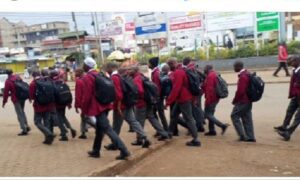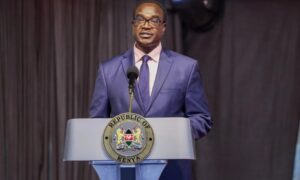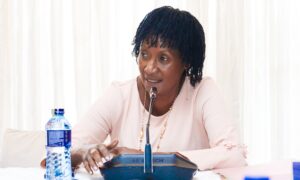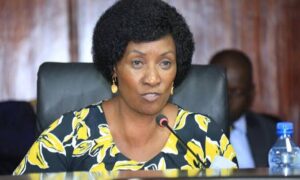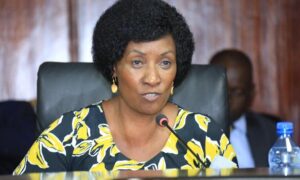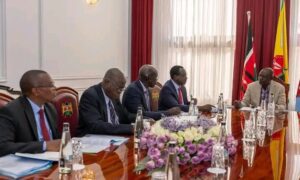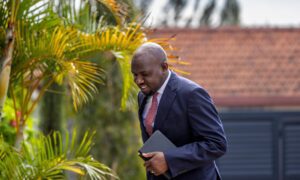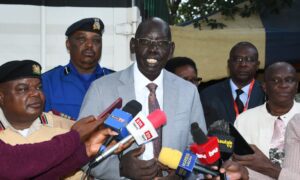The battle for the future of Junior Secondary Schools (JSS) in Kenya is fast turning into a political showdown. Kenya Union of Post-Primary Education Teachers (KUPPET) Secretary-General Akello Misori has boldly challenged President William Ruto’s education reforms, sparking a debate that could reshape both union politics and the education sector.
What began as a policy discussion is quickly morphing into a test of power between a seasoned union leader and a president determined to cement his education legacy. For Misori, the stakes are high—he risks losing his influence, while for Ruto, conceding would mean admitting to flaws in his administration’s education reforms.
Misori’s Defiance at State House
During a recent State House meeting, Misori stunned the audience by demanding that Junior Secondary Schools be returned to secondary institutions. His argument was straightforward: placing JSS in primary schools is undermining quality education, straining teachers, and confusing parents.
This stance directly opposed President Ruto’s decision to move JSS to primary schools soon after assuming office. The Head of State has defended the policy, arguing it reduces congestion in secondary schools and optimizes existing resources.
But Misori’s open defiance—voiced at the heart of government—was no ordinary policy debate. It was a bold move that many analysts interpret as a calculated gamble.
Why Ruto Won’t Back Down
President William Ruto is not known for tolerating public dissent. Since his days as Deputy President, he has built a reputation as a leader who thrives on strength, decisiveness, and control. To reverse the JSS placement would be politically costly, as it would signal that his government acted hastily or wrongly.
Analysts suggest that Misori underestimated the political weight of his remarks. By challenging Ruto in public, he inadvertently painted the president’s flagship education policy as a failure.
“Ruto doesn’t take kindly to being embarrassed in public. Misori’s call was less about education reform and more about questioning Ruto’s leadership,” noted one political observer.
This sets up a dangerous dynamic: Ruto may feel compelled to defend his decision even more fiercely, while Misori may double down to prove his loyalty to teachers.
Teachers Caught in the Crossfire
For thousands of teachers, the issue is not about political egos but about survival and career growth. The debate over JSS placement has exposed deeper concerns within the teaching profession.
- Employment Opportunities: If JSS had been established as an independent entity, thousands of new teaching jobs would have been created. Graduate teachers specializing in secondary-level subjects would have benefitted from employment opportunities.
- Deployment Confusion: Many teachers have been transferred to primary schools without adequate training to handle the Competency-Based Curriculum (CBC). This has left both teachers and learners struggling with mismatched skills.
- Promotion Delays: With JSS tied to primary schools, promotion pathways have become murky. Teachers are unsure whether to expect career advancement under primary or secondary structures.
This reality is why Misori’s demands resonate with teachers, even as they place him on a collision path with Ruto.
Parents and Learners in Limbo
The placement of JSS in primary schools has also unsettled parents. While the government insists it is the most efficient model, parents argue that primary schools lack the infrastructure needed to handle adolescent learners.
- Laboratories: Most primary schools are ill-equipped with science laboratories, limiting learners’ exposure to practical lessons.
- Specialist Teachers: Subjects such as Physics, Chemistry, and Foreign Languages require teachers trained at the secondary level. Many primary schools do not have this expertise.
- Social Development: Grade 7 learners, aged around 12–13, find themselves in the same environment as much younger children, raising concerns about maturity gaps and social development.
This uncertainty has left parents demanding clarity. Should JSS remain in primary schools, or should the government carve out a distinct structure for it?
Union Politics at Stake
Beyond education, Misori’s stand has implications for union politics in Kenya. KUPPET has long positioned itself as the defender of post-primary teachers, often clashing with the Teachers Service Commission (TSC) and the Ministry of Education.
By directly challenging Ruto, Misori is signaling that KUPPET will not be silenced. However, history shows that union leaders who confront the government head-on often face serious repercussions. Some have been sidelined, while others have been forced into compromise.
If Ruto decides to weaken Misori, he could do so by:
- Working with rival factions within KUPPET.
- Elevating more compliant union voices.
- Using TSC directives to undermine KUPPET’s bargaining power.
This makes the coming months critical for Misori’s leadership. Will he emerge as a fearless champion of teachers, or will he be outmaneuvered by state power?
CBC Challenges Remain Unresolved
The clash between Misori and Ruto also highlights broader concerns with the Competency-Based Curriculum (CBC). Since its rollout, CBC has faced constant criticism for being rushed, underfunded, and poorly implemented.
Key issues include:
- Teacher Training: Many teachers report insufficient training to effectively deliver CBC content.
- Resource Gaps: Schools, especially in rural areas, lack the textbooks, technology, and infrastructure needed.
- Equity Concerns: CBC has been accused of widening inequality, with urban learners gaining an advantage over rural counterparts.
Placing JSS in primary schools, critics argue, has only worsened these problems by stretching already limited resources.
What Lies Ahead for JSS
The future of Junior Secondary Schools hangs in the balance. While the government insists it will stay in primary schools, the pressure from unions, parents, and education stakeholders is mounting.
Possible scenarios include:
- Maintaining the Status Quo: Ruto could double down and insist JSS remain in primary schools, while promising to gradually improve infrastructure.
- Partial Independence: The government could move towards granting JSS semi-autonomy, allowing for distinct staffing and funding.
- Return to Secondary Schools: A full reversal is unlikely but could happen if political pressure grows too strong.
For now, teachers, parents, and learners can only watch as political battles shape the destiny of an entire generation.
Conclusion
Akello Misori’s confrontation with President Ruto is more than a union leader’s cry for teachers—it is a battle over education policy, political power, and the future of thousands of learners.
While Misori positions himself as a fearless advocate, he risks being branded a political enemy of the president. On the other hand, Ruto, keen to defend his reforms, may refuse to back down, no matter the cost.
What is clear is that the fate of Junior Secondary Schools will remain a defining debate in Kenya’s education system for years to come. For now, teachers and parents are left wondering: will learners’ interests come first, or will politics continue to dictate the classroom?







